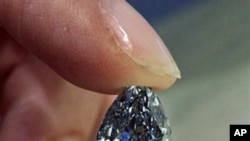Liberian diamonds are being sold in Sierra Leone in violation of the Kimberley Process that is intended to track the origin of conflict minerals. Liberia's government is trying to stop that trade and regain lost tax revenue.
Diamond profits fueled much of the violence in the long-running civil wars in Liberia and Sierra Leone.
Former Liberian President Charles Taylor is on trial at the International Criminal Court on charges of crimes against humanity for supporting Sierra Leone's main rebel group. Prosecutors argue those rebels paid Mr. Taylor with diamonds mined along their common border in the Mano River basin.
In Liberia's Grand Cape Mount County, youth leader Morris Trawally says security along the border has greatly improved with the election of a government to replace Mr. Taylor.
"Certainly things have overwhelming improved since the departure of the former president of Liberia," said Morris Trawally. "As you know, when he was here things were not in place as compared to now. We must commend the government of Ellen Johnson-Sirleaf. They are doing well through the backing of the United Nations mission in Liberia."
Farmer Emmanuel Wiah says cross-border trade between Sierra Leone and Liberia is now much as it was before the wars.
"The relationship between Sierra Leone and Liberia is courteous," said Emmanuel Wiah. "The free flow of businesses between Liberia and Sierra is still on course. On a daily basis, as I tell you, most people normally do buy from Sierra Leone and also buy from Liberia."
But some of that cross-border trade continues to be in diamonds, in violation of the U.N.'s 2003 Kimberley Process, which is meant to certify the origin of rough diamonds to assure consumers they are not financing human-rights abuses.
Instead of carrying his stones 100 kilometers to Monrovia, Liberian diamond miner Fallah Varney says there is more money selling to Sierra Leonean diamond agents who come to the border from Freetown, Bo, and Kenema.
"They come from various diamond mining agencies," said Fallah Varney. "They come in search of diamonds in Liberia. And we sell to them and they get across."
Varney says Liberian border agents warn diamond dealers that the cross-border trade is illegal. But he sees nothing wrong with it, since he says those officials are easily bribed.
"I do not want to say 'illegal' because the security personnel, especially the customs officers and some immigrations and stuff like that know," he said. "They are aware. Most of the time we come to them and say, 'Look, this is the business we are getting across.' And we give them their tip of the stuff."
A local parliamentarian says poor law enforcement in the diamond-mining area has drawn in criminals from across West Africa.
"The people who are stealing the gold and diamonds, plenty of them come from other countries," he said.
He says lawmakers are drafting legislation to better regulate Liberia's diamond industry.
"The people go there with their water pumps," he said. "They go their with their diggers, their shovels. They are just digging our gold and digging our diamonds. This government is putting together a small, small law so that the diamond and gold sector can be protected and guarded."
Because Liberia has been unable to attract legitimate foreign investment in the area, the parliamentarian says it is time for the government to create its own company to buy up Liberian diamonds.
"Instead of the diamonds just being taken out like that - no money for the people to develop the country, no money for the government to do anything - the government can organize its own company and go in there, so that money the government will get will be able to help the people," he said.
In temporarily suspending its arms embargo, the U.N. Security Council called for the government in Monrovia to better monitor the flow of diamonds between Sierra Leone, Liberia, and Ivory Coast - all countries still recovering from violence partly funded by conflict minerals.
Additional reporting by Prince Collins in Liberia.









